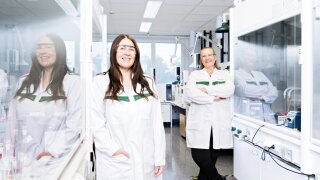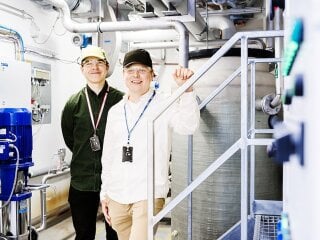Christina Holappa’s career as a laboratory technician started from a desire to find an interesting job in her home town of Hanko. The more traditional form of studying in a classroom no longer appealed to her.
“Right from the beginning, an apprenticeship was a way for me to get a new career. I've always been good at maths and science, so the laboratory technology field was an easy choice for me. I contacted Omnia in Espoo and Fermion myself to inquire about the possibility of apprenticeship training. Things moved quickly after that,” says Holappa.
“When I started my apprenticeship at Fermion’s QC laboratory, I was immediately treated like any other colleague and quickly became part of the work community. I was also paid a salary throughout the apprenticeship.”
Pharmaceutical industry has complex regulations
The Fermion plant in Hanko manufactures active pharmaceutical ingredients. Fermion’s QC laboratory analyses the raw materials, intermediate products and stability samples needed in the manufacture of pharmaceuticals.
The laboratory also sends many samples to Orion’s other laboratories for analysis. Several analysis techniques are constantly in use in the laboratory and, as a rule, laboratory technicians are trained to be proficient in all techniques.
Liisa Sinervo, QC Manager at Fermion in Hanko, says that the induction of an apprentice ultimately differs very little from that of a new laboratory technician. All new employees have to work hard to learn about the pharmaceutical industry’s regulated GMP (Good Manufacturing Practice) environment, the numerous analysis techniques and systems.
“We give the apprentice time to become proficient in the theory of the analyses and we ensure that the exams that are part of the studies are completed on time,” says Sinervo.
Holappa was also surprised by the precision required in the work: “There was a lot to learn at the beginning. In a quality control laboratory, it's incredibly important to be systematic and to document everything according to the guidelines.”
However, one analysis at a time, Holappa became proficient in both the techniques and working methods. Soon she was doing the same analyses as the other technicians in the laboratory.
Apprenticeships benefit both the apprentice and the employer
The Vocational Qualification in Laboratory Technology consists of 180 credits, most of which can be completed through an apprenticeship in a company. Before the apprenticeship section of the course started, Holappa completed, among other things, IT studies, mathematics courses and the basics of working in a laboratory, at Omnia. For some of the courses it is also possible to transfer the credits already gained at upper secondary school.
“I completed all my other studies, apart from my bioanalytics exam, during my apprenticeship at Fermion. I qualified as a laboratory technician in just over a year, which is much faster than if I had studied only at an educational institute,” says Holappa.
Apprenticeships have proven to be a good way for Fermion to attract committed talents.
“Hanko is a pleasant place to live, but a bit remote from the Helsinki Metropolitan Area, for example. We are looking for talents who want to stay in Hanko and at Fermion. Apprenticeships have enabled us to recruit highly motivated employees with initiative and willingness to learn,” Sinervo says.
Fermion has trained a number of students through apprenticeships for the laboratory technology field in recent years. All of these students were employed by Fermion after qualifying.
How do apprenticeships work?
- An apprenticeship is on-the-job learning, which is complemented with studies at an educational institute.
- An apprenticeship can be used to complete all or part of a qualification. Apprentices are paid a salary according to the collective agreement.
- An apprenticeship is a hands-on way to develop professional skills. They are suitable for everyone, regardless of background or age, and can be started flexibly at any time throughout the year.
Sources:
https://www.omnia.fi/en/study-options/upper-secondary-vocational-qualifications/apprenticeship
https://www.studentum.fi/tietoa-hakijalle/mita-sinun-tulee-tietaa-oppisopimuksesta-14074











